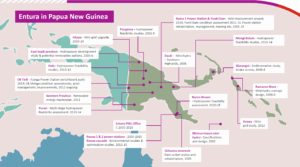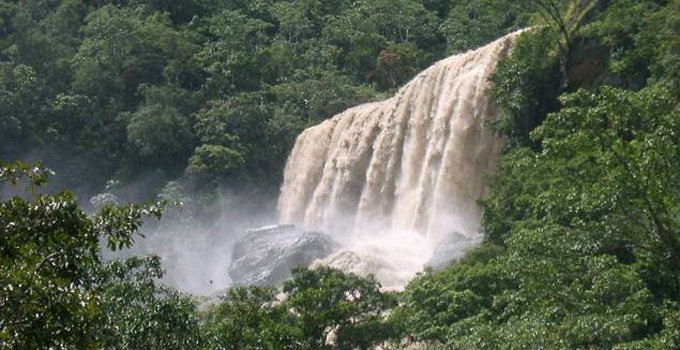LATEST NEWS
Marking 40 years of supporting renewable energy and building capacity in Papua New Guinea
25 September, 2025
For four decades, Entura has been working alongside Papua New Guinea’s hydropower operators to keep the lights on – and now we’re helping power the future with solar and battery mini-grids in remote areas.
As Papua New Guinea celebrates 50 years of independence, we’re proud to celebrate 40 years of collaboration.
(Click on image to enlarge)
Our relationship with PNG began in the mid-1980s, when PNG Power personnel first began coming to Tasmania on secondments to train with Hydro Tasmania’s portfolio of hydropower assets. This program built strong relationships between PNG Power and Hydro Tasmania, making Entura (Hydro Tasmania’s consulting arm) a natural choice of hydropower consultant to strengthen and modernise PNG’s hydropower assets over many decades.
It’s now approximately 20 years since Entura significantly lifted our in-country presence and hydropower support in PNG, continuing to work with PNG’s existing hydropower assets but also opening an office in Port Moresby as a base to explore the potential for new hydropower developments.
“In the early to mid-2000s, we really intensified our on-ground work in PNG,” says Dr Amanda Ashworth, Entura’s Managing Director. “Our people explored the feasibility of many potential opportunities for new hydropower schemes, but we also continued providing substantial technical support for refurbishment, operations and management of some of PNG’s most significant power stations to improve safety, availability and reliability, and extend the useful life of these important assets.”
Hydropower – the backbone of PNG’s power
Papua New Guinea is one of the least electrified nations in the world: only about 20% of its population of roughly 10 million currently have reliable electricity, with most supply concentrated in urban areas. PNG is aiming for 70% electrification by 2030 – a bold target that will transform lives.
Hydropower naturally plays a central role: PNG is richly endowed with high rainfall and mountainous catchments. However, by the 2000s, the existing hydropower stations were challenged by issues such as sedimentation, deteriorating infrastructure, limited safety systems and difficulties accessing spare parts. These are precisely the kinds of challenges Entura has helped address – and that we continue to support.
One of Entura’s achievements is working on the Ramu 1 Power Station in PNG’s Eastern Highlands. With some of the plant’s generators installed in the 1970s, breakdowns and operating restrictions had caused the plant’s output to fall. Our multi-year and multi-disciplinary involvement – stretching from initial condition assessment through to Owner’s Engineer services – helped restore and upgrade performance, reliability and availability.
Likewise, aging stations such as Rouna 2 and Ok Menga (which powers the Ok Tedi mining operation) have benefited from modernisation, more rigorous maintenance, safety upgrades and support in risk and asset management.
A number of projects have extended over many years, so Entura knows these hydropower assets intimately, enabling us to advise on asset management, modernisation and refurbishment.
Building local capacity for true sustainability
Capacity-building has been a key focus of Entura’s services in PNG.
“For genuine sustainability, infrastructure needs skilled people to run it and maintain it into the future,” says Amanda. “Our specialists have worked side-by-side with PNG Power Limited, Ok Tedi Mining and other local operators, often living or working in PNG for long periods, to foster local capability to run and care for hydro assets in challenging circumstances,” she says.
As well as providing on-the-ground mentoring in embedded roles in key power stations, Entura has delivered tailored short courses through our training institute, ECEWI, extending from hydropower operations and asset management to dam safety and holistic catchment management.
From hydropower to hybrids
As PNG pushes toward its 2030 electrification targets, the combination of hydropower renewal plus new hybrid renewable systems holds promise.
PNG has many remote and island communities that aren’t serviced by grid electricity. In these areas, hybrid renewable systems – combining hydro when available, solar, battery storage and diesel or other backup – offer resilient solutions that reduce reliance on expensive diesel fuel and lessen carbon emissions.
Entura is excited to be part of this new energy frontier in PNG, says Amanda, given Entura’s commitment to supporting Australia’s Pacific neighbours to extend electrification and achieve their clean energy targets.
“We are very active across the Pacific in hybrid renewable systems, both on grid and off grid, drawing on the strong foundation of our long-term involvement with the world-leading remote hybrid systems established by Hydro Tasmania on King Island and Flinders Island in Bass Strait,” says Amanda.
“Now, we’re applying that innovation and technical insight across the Indo-Pacific region, including in Tonga, Federated States of Micronesia, Tuvalu, Cook Islands, Solomon Islands, Marshall Islands and Maldives,” she says.
In recent years in PNG, Entura has been engaged as technical consultant through the Economic and Social Infrastructure Program (ESIP), funded by Australia’s Department of Foreign Affairs and Trade, to oversee the design, supply and installation of solar PV, batteries and a control system to upgrade the Aitape mini-grid. The upgraded hybrid system is expected to deliver 56.5% renewable energy with on average 11.5 hrs of ‘diesel-off’ per day, reducing the cost of electricity generation and providing a modern, safe and reliable power source for Aitape.
“With our long-term experience of maintaining and upgrading Tasmania’s hydropower assets, our formal training institution (ECEWI), and our broader regional work in flexible, resilient hybrid renewables and off-grid systems, Entura is well placed to continue supporting PNG as it strives to meet its electrification and clean energy goals,” says Amanda.
“We look forward to many more decades of partnering with our valued clients in PNG.”
Read our case studies and articles about Entura’s successes in PNG
Hydropower rehabilitation, modernisation and asset management
- Ramu 1 Hydropower Station (Eastern Highlands): From around 2005–15, Entura worked on condition and risk assessment, refurbishment, upgrades, reservoir sedimentation assessment, hydrology, hydraulic testing, load flows, etc.
- Rouna 2 Hydropower Station (Laloki River cascade): An underground station from the 1960s, operating with many safety hazards (single exit route, flood/fire/smoke risks etc.). Entura led a project to upgrade and modernise it (2005–09), replacing and refurbishing generators, installing controls, safety systems, ventilation, fire protection, emergency exits, etc. Read more about our work in this thought leadership article.
- Ok Menga (Ok Tedi Mining Limited): Entura has been involved in rehabilitation and asset management to maintain the station which supplies ~75% of the power for the mine and township. Because of isolation, outage consequences are high; diesel replacement is costly and lost production from the mine is in the order of hundreds of thousands of dollars per day of outages. Entura’s work has included extensive condition assessments, risk mitigation, urgent remedial actions, planning ‘quick wins’, and importantly, building the capability of local staff. Read more about our work in this thought leadership article.
Hydropower optimisation and feasibility studies
- Cascade management of the Rouna Scheme: Entura carried out comprehensive modelling, inflow forecasting, energy generation software, feasibility for upgrades and new stations (e.g. Rouna 5), dam safety assessments, spillway upgrade proposals etc.
- Mongi-Bulum hydropower project (Morobe Province, 2013-14): Entura assisted PNG Power Limited with a pre-feasibility study of a new 116 MW hydropower scheme. Tasks included site selection, geological reconnaissance, flow and energy assessments, cost estimates and economic analysis.
- Hela hydropower project (Hela Province, 2013-14): Entura undertook a feasibility assessment for a new 167 MW hydropower project. The layout included dam, tunnels, shaft, and an underground station.
- Naoro Brown project (Port Moresby region, c2010-15): Feasibility studies to supply new renewable generation capacity to Port Moresby (reducing reliance on diesel) via hydroelectric generation. Included hydrological and geotechnical studies, system modelling, headrace tunnels, etc.
- Purari River hydropower scheme: Entura was part of a consortium (led by AECOM) that conducted feasibility, environmental and social impact studies for a very large hydropower scheme (>2,000 MW) on the Purari River.






